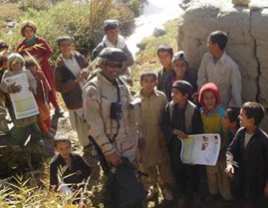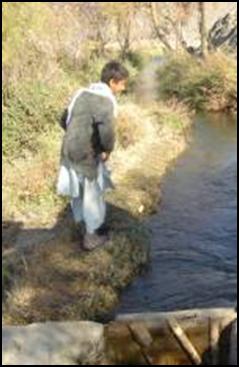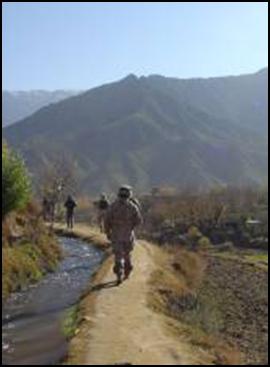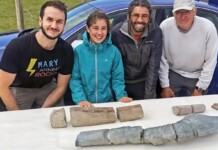 The U.S. plans to double their construction workload in the next year to provide new roads, electric power and water distribution systems to the Afghan people, the U.S. Army’s top engineer said yesterday. The Army Corps of Engineers will expand their development work in the coming fiscal year beginning this month to some 600 projects, an investment of more than $1 billion, said Lt. Gen. Carl A. Strock. Local Afghan children visit the site of a micro-hydro powerstation (photo)
The U.S. plans to double their construction workload in the next year to provide new roads, electric power and water distribution systems to the Afghan people, the U.S. Army’s top engineer said yesterday. The Army Corps of Engineers will expand their development work in the coming fiscal year beginning this month to some 600 projects, an investment of more than $1 billion, said Lt. Gen. Carl A. Strock. Local Afghan children visit the site of a micro-hydro powerstation (photo)
By videoconference from Kabul, Strock described their focus as mainly on transportation, electricity and water delivery and said the progress is “steady and relentless.â€
About 921 kilometers of roads are under construction or have been completed, including a circuitous road network to connect Afghanistan’s chief cities and boost their economic development.
“We’re very close to completing the national ring road, which is the primary road which links all the major cities around the circumference of the country,†Strock explained. Secondary roads are also being built, he said, to connect provincial centers and villages, with a number of nations — the Japanese, the Indians and others — working on the project.
Employing Afghans
To help private industry get back on its feet, Strock explained that the Army employs Afghan companies as contractors. “We’ve worked with the local industry. And now, every time that we put out a bid, we get about 13 Afghan firms bidding.”
The Corps tries to “incentivize” its contractors to provide for individual employees to be trained in the trade crafts.
“They learn the business of becoming an electrician, a carpenter, a plumber or a mason,” said Strock. “In fact, they’re quite good masons, and we’re learning a bit from them.”
Water Supplies Electricity
 To address the shortage of electricity in the country, the Corps has completed about 70 micro-hydroelectric plants in six different provinces, with an investment of about $3.4 million. These plants use gravity and existing streams that flow year-round to provide a practical method to bring energy to remote mountain villages. They are simple to install and operate, inexpensive and sustainable, and little to no water is lost during the process.
To address the shortage of electricity in the country, the Corps has completed about 70 micro-hydroelectric plants in six different provinces, with an investment of about $3.4 million. These plants use gravity and existing streams that flow year-round to provide a practical method to bring energy to remote mountain villages. They are simple to install and operate, inexpensive and sustainable, and little to no water is lost during the process.
With a minimum drop of three meters (to create head pressure), local villagers team up with with the Corps contractors to construct the feeder channel and pump house while the Afghan people themselves learn how to operate and maintain the system. (photo) A local boy checks out the feeder channel
Every one meter drop generates about one kilowatt of electricity. Systems generate between 10 to 30 kilowatts. In a village of 100 homes, the smaller systems provide 100w to each home – enough to power a TV and 2 small light bulbs, said Deputy Engineer for Programs and Project Management Rich Dickson.
“We also have noticed that the ingenuity of the people (who have) converted them to other uses,” reports Strock. “Instead of putting a drive belt to a generator, they’ve put the drive belts to small grist mills in which they grind their grain into flour, and that helps them produce their bread.”
Getting the Word Out
Strock acknowledged many Afghans might not know about ongoing reconstruction projects because of the size of the country and poor communications.
 “I’ve taken the opportunity to take some Afghan media with me on the trips that I’ve made out around the country and, as a small sampling of the Afghan people, these journalists were absolutely amazed at the things that are going on out there that they had no idea about.”
“I’ve taken the opportunity to take some Afghan media with me on the trips that I’ve made out around the country and, as a small sampling of the Afghan people, these journalists were absolutely amazed at the things that are going on out there that they had no idea about.”
The country’s rugged terrain, he explained, makes it “very difficult for people to really understand what’s going on if you’re not in the immediate vicinity of one of our projects†Part of the challenge is getting the word out about projects being undertaken that will eventually improve their lives. (photo) Engineers inspect feeder channel for hydropower
“I think we have sufficient resources, and we’re now in the process of gaining that irreversible momentum we seek,†the general said.
(Transcript of Videoconference)



















